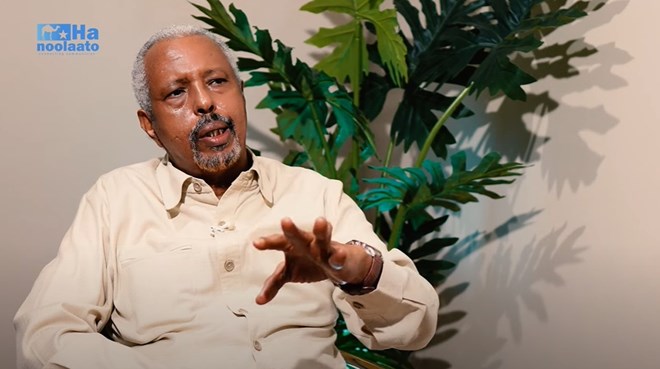
Friday October 18, 2024

Former Hirshabelle President Ali Abdullahi Osoble speaks during an interview with Ha Noolaato TV, where he called for the dissolution of Hirshabelle, citing growing tensions in the region. Credit: Ha Noolaato TV
Beledweyne (HOL) — Ali Abdullahi Osoble, the former president of Hirshabelle, has called on President Hassan Sheikh Mohamud to dissolve the regional administration of Hirshabelle.
“The people of Hiiraan have rejected Hirshabelle, and I can confirm its demise as the first president,” Osoble, who served as the state’s first president, openly declared during an interview with the Ha Noolaato YouTube channel. He blames current President Ali Guudlawe’s “extended one-man rule” for alienating Hiiraan’s key constituencies, particularly the Hawadle clan, through prolonged leadership that has exacerbated existing tensions.
“Ali Guudlawe’s tenure has caused widespread resentment, as demonstrated by the large crowds celebrating Hiiraan State. These gatherings reflect the deep frustrations of the Hiiraan people.”
Hirshabelle’s formation in 2016 was contentious from the start. The Federal Government of Somalia (FGS) merged Hiiraan and Middle Shabelle into one Federal Member State (FMS) despite opposition from Hiiraan leaders, who pushed for a separate FMS. This exclusionary process, conducted in haste, laid the groundwork for ongoing grievances. The FGS, eager to hold elections, prioritized political expediency over consensus-building, further fueling grievances in Hiiraan. Locals contend that the electoral process was marred by federal interference.
The situation escalated in 2020 when Guudlawe, from the Abgal clan of Middle Shabelle, was elected president. Hiiraan’s dominant Hawadle clan viewed this as violating an informal ‘handshake’ agreement, whereby Jowhar in Middle Shabelle was designated Hirshabelle’s capital city, while the Hawadle clan, which predominates in Hiiraan, was given the presidency. The decision to retain Jowhar as the state capital further deepened these divisions.
Arguably, the two clans had conflicting interpretations of the original informal agreement. Hawadle leaders believed it would lead to their long-term control of the presidency, while Abgal leaders saw it as a temporary arrangement, lasting only four years, after which the presidency could rotate to other clans.
Tensions in Hiiraan have not remained confined to political rhetoric. Armed resistance against Hirshabelle’s governance has emerged, most notably through the Hiiraan Rescue Council, led by former military general Abukar Warsame’ Huud.’ The militia prevented President Guudlawe’s inauguration in Beledweyne for over a year, demanding a separate FMS for Hiiraan.
“The only viable solution is for President Hassan Sheikh to dismantle Hirshabelle and create a system that meets the needs of all people,” Osoble argued, urging the dissolution of the regional state through a presidential decree.
Hirshabelle’s governance has been faced with challenges since its inception. The state has struggled to establish control, with internal divisions preventing effective revenue collection and governance. Ongoing disputes over clan representation in the state legislature and security forces have further paralyzed the administration.
Adding to the region’s challenges is the presence of Al-Shabaab, which remains active in large areas of Hirshabelle.
Osoble’s call for dissolution reflects the broader frustrations of Hiiraan residents. “Hiiraan State,” although not officially recognized, has emerged as a reaction to years of perceived neglect and marginalization by Hirshabelle’s leadership.
Osoble’s statement follows large-scale celebrations last week in Beledweyne, Mogadishu, and internationally for the self-declared Hiiraan State. These celebrations, marking Hiiraan’s symbolic break from Hirshabelle, have been a rallying point for those dissatisfied with the current political structure. However, the growing support for Hiiraan State has not come without consequences. Tensions boiled over last week when forces loyal to Hirshabelle clashed with Hiiraan State militia in Beledweyne, leaving one soldier dead and another injured. The fighting, sparked by Hirshabelle’s attempt to disrupt Hiiraan State’s first-anniversary celebrations, is the latest in a series of violent confrontations.
Political analysts argue that Hirshabelle’s long-term stability hinges on meaningful reconciliation between the people of Hiiraan and Middle Shabelle. Resolving disputes over power-sharing, clan representation, and the location of the state capital is essential for establishing a functional political settlement.
Osoble argues that Hirshabelle’s current structure is unsustainable, citing years of unresolved grievances, ineffective governance, and widespread discontent, particularly in the Hiiraan region. For Osoble, the only solution lies in dismantling the system.
“President Hassan Sheikh established Hirshabelle through a presidential decree. Now, the only way forward is to issue another decree to dissolve it and create a new system that addresses the needs of all the people,” Osoble added.






